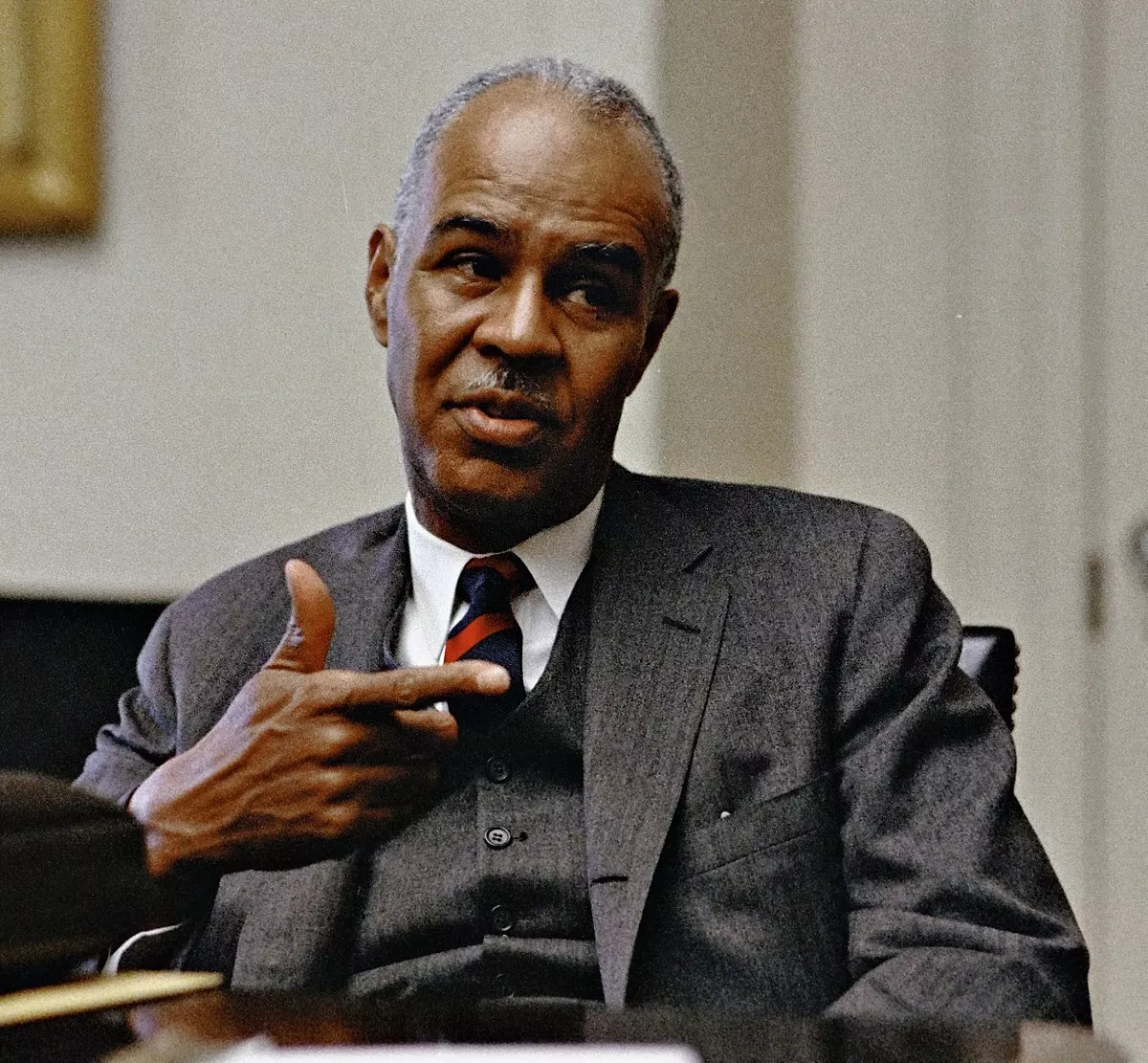 1.
1. Roy Ottoway Wilkins was an American civil rights leader from the 1930s to the 1970s.

 1.
1. Roy Ottoway Wilkins was an American civil rights leader from the 1930s to the 1970s.
Roy Wilkins controversially advocated for African Americans to join the military.
Roy Wilkins was born in St Louis, Missouri, on August 30,1901.
Roy Wilkins's father was not present for his birth, having fled the town in fear of being lynched after he refused demands to step away and yield the sidewalk to a white man.
Roy Wilkins graduated from the University of Minnesota with a degree in sociology in 1923.
When W E B Du Bois left the organization in 1934, Wilkins replaced him as editor of The Crisis, the official magazine of the NAACP.
From 1949 to 1950, Roy Wilkins chaired the National Emergency Civil Rights Mobilization, which comprised more than 100 local and national groups.
Roy Wilkins served as an adviser to the War Department during World War II.
In 1955, Roy Wilkins was chosen to be the executive secretary of the NAACP and in 1964, he became its executive director.
Roy Wilkins had developed an excellent reputation as a spokesperson for the Civil Rights Movement.
Roy Wilkins believed in achieving reform by legislative means, testified before many Congressional hearings, and conferred with Presidents Kennedy, Johnson, Nixon, Ford, and Carter.
Roy Wilkins strongly opposed militancy in the movement for civil rights as represented by the "black power" movement because of his support for nonviolence.
Roy Wilkins was a strong critic of racism in any form regardless of its creed, color, or political motivation, and he declared that violence and racial separation of blacks and whites were not the answer.
Roy Wilkins was a member of Omega Psi Phi, a fraternity with a civil rights focus and one of the intercollegiate Greek-letter fraternities established for African Americans.
In 1968, Roy Wilkins served as chair of the US delegation to the International Conference on Human Rights.
In 1977, at the age of 76, Roy Wilkins finally retired from the NAACP and was succeeded by Benjamin Hooks.
Roy Wilkins was honored with the title Director Emeritus of the NAACP in the same year.
Roy Wilkins died on September 8,1981, in New York City, from heart problems related to a pacemaker implanted on him in 1979 because of his irregular heartbeat.
In 1982, his autobiography, Standing Fast: The Autobiography of Roy Wilkins, was published posthumously.
Roy Wilkins was a staunch liberal and proponent of American values during the Cold War.
Roy Wilkins denounced suspected and actual communists within the Civil Rights Movement.
Roy Wilkins had been criticized by some on the left of the movement, such as Daisy Bates, Paul Robeson, W E B Du Bois, Robert F Williams, and Fred Shuttlesworth, for his cautious approach, suspicion of grassroots organizations, and conciliatory attitude towards white anticommunism.
At the time of Robeson's widely misquoted declaration at the Paris Peace Conference that blacks would not support the United States in a war against the Soviet Union because of the continued lynchings and their legal second-class citizen status after World War II, Roy Wilkins stated that regardless of the number of lynchings that then occurred or would occur, black Americans would always serve in the armed forces.
Roy Wilkins threatened to cancel a charter of an NAACP youth group in 1952 if it did not cancel its planned Robeson concert.
Roy Wilkins' views towards the participation of black military members in the US military was a point of contention between him and other prominent civil rights leaders.
Roy Wilkins emphasized the financial benefits of serving in the military along with the importance of African-American citizens participating in the first integrated American army.
Roy Wilkins died on September 8,1981, in New York City, at the age of 80.
In 1982, his autobiography Standing Fast: The Autobiography of Roy Wilkins was published posthumously.
Roy Wilkins is played by Joe Morton in the 2016 television drama All the Way.